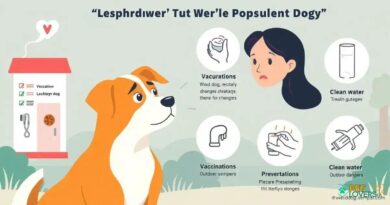What is Weaning
What is Weaning?
Weaning is a crucial developmental stage in a puppy’s life, marking the transition from a milk-based diet to solid food. This process typically begins around the age of three to four weeks when puppies start to show interest in their mother’s food. Weaning is not just about changing the diet; it also plays a significant role in the social and behavioral development of the puppies, as they learn to interact with their littermates and explore their environment.
The Importance of Weaning
Understanding what weaning entails is essential for any dog owner or breeder. Proper weaning ensures that puppies receive the necessary nutrients for healthy growth while also encouraging independence from their mother. A well-timed weaning process can prevent issues such as malnutrition or behavioral problems later in life. It is a critical period that sets the foundation for a puppy’s future health and well-being.
Signs That Puppies Are Ready to Wean
Puppies exhibit several signs indicating they are ready to begin the weaning process. These signs include increased curiosity about solid food, the ability to chew, and a decrease in nursing frequency. Additionally, puppies may start to play with each other more, showcasing their growing independence. Recognizing these signs is vital for ensuring a smooth transition from milk to solid food.
Steps to Wean Puppies
The weaning process should be gradual, typically spanning several weeks. Start by introducing a high-quality puppy food mixed with water or puppy formula to create a gruel. Gradually increase the amount of solid food while decreasing the liquid content. This method helps puppies adjust to the new texture and taste. It’s essential to monitor their reactions and adjust the diet accordingly to ensure they are thriving during this transition.
Feeding Schedule During Weaning
Establishing a feeding schedule is crucial during the weaning process. Puppies should be fed small, frequent meals throughout the day to help them adjust to solid food. A typical schedule might include four to six meals daily, gradually reducing to two or three meals as they grow older. Consistency in feeding times helps puppies develop a routine, which is beneficial for their overall training and behavior.
Common Challenges in Weaning
While weaning is a natural process, it can come with challenges. Some puppies may resist eating solid food or experience digestive upset as they transition. It’s essential to be patient and persistent, offering different food textures and flavors to entice them. If a puppy continues to refuse food or shows signs of distress, consulting a veterinarian is advisable to rule out any underlying health issues.
Nutrition During Weaning
Providing the right nutrition during weaning is critical for a puppy’s development. High-quality puppy food should be rich in protein, fats, vitamins, and minerals to support their rapid growth. It’s important to choose a diet specifically formulated for puppies, as adult dog food may not meet their nutritional needs. Always check the ingredients and opt for brands that prioritize natural ingredients without fillers.
Monitoring Puppy Health During Weaning
During the weaning process, monitoring the health of the puppies is essential. Keep an eye on their weight, energy levels, and overall behavior. Healthy puppies should be active, playful, and steadily gaining weight. Any significant changes in appetite, lethargy, or gastrointestinal issues should be addressed promptly with a veterinarian to ensure the puppies remain healthy throughout the weaning phase.
Socialization During Weaning
Weaning is not only about diet; it is also a critical time for socialization. As puppies begin to eat solid food, they should also be exposed to various stimuli, including different people, environments, and other animals. This exposure helps them develop essential social skills and reduces the likelihood of behavioral issues in the future. Positive experiences during this time can lead to well-adjusted adult dogs.
When to Fully Wean Puppies
Full weaning typically occurs around eight weeks of age, although this can vary depending on the breed and individual development of the puppies. By this age, they should be eating solid food exclusively and no longer nursing from their mother. It’s important to ensure that the transition is smooth and that the puppies are fully prepared for their new homes, equipped with the necessary skills and health to thrive.




